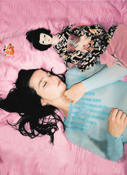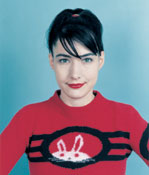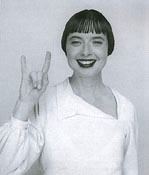 |
  |
 |
  |
 |
 |
| |

Read Bjork's2001 interview with Juergen Teller from the index archives. |

|
 |

Kathleen Hanna discusses writing and making music in this interview from 2000 with Laurie Weeks. |
|
 |
|
 |
|
|
 |

Isabella Rossellini spoke with Peter Halley in this 1999 interview. |
|
 |
|
|
 |
 |
|
Alexander McQueen's 2003 interview with Bjork. |
|
 |
|
|
 |
|
 |
Isabelle Huppert, 2002 |
 |
 |
 |
 |
 |
WITH CORY REYNOLDS
PHOTOGRAPHED BY JUERGEN TELLER |
 |
 |
 |
 |
 |
CORY: I just
saw The Piano Teacher in New York. I’m not sure if I’ve
ever seen a movie with that degree of sustained psychological tension.
I can’t imagine what it must have been like to work on it for months
and months.
ISABELLE: I guess the film was easier to make than it was to watch.
I’ve heard that a couple of people actually fainted in cinemas in
Spain and Portugal, and ambulances were called to one of the New York
screenings too. [laughs] I mean, I didn’t go to the hospital myself
every other day when I was shooting it.
CORY: You seemed to be holding so much in. At the end of each work
day, didn’t you feel spent and empty?
ISABELLE: No, no. Whether the performance is internalized or externalized,
you get the same sense of accomplishment at the end of the day.
CORY: So it was all in a day’s work, in a way?
ISABELLE: That’s right, it’s work.
CORY: In the movie you play a piano teacher at the Vienna Conservatory
who still lives with her mother. Psychologically speaking, your character,
Erika, is deeply masochistic. How did you come to understand her?
ISABELLE: To me, The Piano Teacher isn’t so
much about masochism. There is a scene where Erika gives her boyfriend
a letter detailing all of the sadistic things that she wants him to do
to her. And she does show him a box of gags and ropes and things that
she keeps under her bed. But I would say her story is more about the fear
of losing control. It’s the story of a girl who is locked inside
herself. I say girl, rather than woman, because for me Erika is stuck
in an arrested adolescence — that’s what gives you that terrible
feeling.
CORY: I wasn’t thinking of her so much as sexually masochistic.
But I do think she’s emotionally masochistic. She refuses to let
herself experience love.
ISABELLE: Oh, of course. In that sense she is definitely a masochist.
But for me, the most powerful thing about the film is that it really lets
you into her intimacy in a strange and extraordinary way. When you watch
The Piano Teacher, you really are inside the body of this girl.
You watch her doing things that you’re not used to seeing, like
peeing, and having her period.
CORY: And cutting herself, and visiting porn emporiums. I guess this
dark reality is one of the trademarks of Michael Haneke’s films?
ISABELLE: Oh yes, his films are very dark. I would say that Haneke
is especially interested in examining the difference between real violence
and the kind of violence that is usually depicted on screen. His films
are attempts to show what violence looks like in reality.
CORY: How much did he have to do with the way you inhabited the character?
ISABELLE: Not much. We had a great silent understanding of one
another. Michael Haneke is not a sentimental director, and I’m not
a sentimental actress. I always had a very strange feeling when I’d
watch the daily footage, like, “How could he possibly have read
my thoughts so perfectly?” And I think the film’s treatment
of music had a lot to do with our mutual understanding, and how we communicated.
CORY: It looked like you played the piano yourself in the film. I was
amazed.
ISABELLE: Well, I had practiced the piano for years when I was
a little girl, and I worked with a piano teacher in Vienna throughout
the shooting of the film. So I was able to play the Bach concerto, because
the section they used only needed one hand, and a Schubert trio. But the
moment two hands were required, I couldn’t do it. [laughs]
CORY: In many ways the film is about the beauty and perfection of music.
What was it like shooting in Vienna?
ISABELLE: Music is everywhere in Vienna. When you are there, you
really get a sense of what music means to the people of that city. After
all, Austria was the country where Mozart and Schubert were born. That
history is very much imprinted in people’s minds and their behavior.
You understand why the Viennese are attracted to a certain idea of perfection,
because they have such a high standard of what music should be. And you
begin to see how a person like Erika would want to sacrifice her life
in order to perform classical music.
CORY: Is it hard for you to work outside of Paris for long periods
of time? I know you have a family.
ISABELLE: I have three children. One is eighteen, one is fourteen,
and the youngest is four. They come and visit, I go and visit. Whenever
there’s a little break, I jump on the first plane I can.
CORY: How do you approach your roles? Do you have a consistent method?
ISABELLE: I wouldn’t say I have a method, but I’m
quite attached to the idea of trying to get as close as possible to the
truth. Very often, actors want to idealize their characters, or they want
to be as fascinating as possible to the audience. That has never been
my concern. I’d rather focus on what I think reality is, with all
its ambiguities and complexities and shadows. A little bit of good and
bad — that’s a human being, you know?
CORY: Even so, you’re known for choosing particularly edgy roles.
ISABELLE: I never play entirely sympathetic characters. But the
great thing about film today is that the line between good and bad is
more blurred than it was thirty or forty years ago. So in some ways, I’m
just reflecting the spirit of our time, when it’s so difficult to
determine who is normal and who is insane.
CORY: For example, Erika.
ISABELLE: A lot people have talked about her as being insane or
abnormal — and of course I never entertained the idea that she was
not normal. I mean, for me she’s quite normal. Or if she’s
not normal, then nobody is.
CORY: A lot of the people who make huge sacrifices for classical music
— let’s say child prodigies and their parents — develop
strange complexes. Can you describe the relationship between Erika and
her mother?
ISABELLE: At first glance, it seems that the mother dominates the
daughter as if she were still a little girl. She doesn’t want her
daughter to buy pretty dresses for herself. She even controls all of the
money that Erika earns. However, on a deeper level, it’s hard to
say who controls whom. To me, the daughter is in an oedipal position with
the mother, because there is no man in their relationship. The father
has been put away in an insane asylum, presumably a long time ago, and
he actually dies during the course of the film. So it’s almost as
if the girl replaces the father. It’s a re-coupling, and one of
them has to be the man.
CORY: It’s an odd incest. Erika and her mother sleep side by
side in one bed every night. And at the end of the movie, she attacks
her mother in a very sexual way. Both women are in their nightgowns, in
bed ...
ISABELLE: To me, that scene is the perfect example of how Michael
Haneke is able to make a scene bigger then what’s written on paper.
In the script, that was definitely an incest scene — a daughter
was making love to her mother. Michael managed to turn it into a more
primitive interaction, as if Erika were a little girl trying to get back
into her mother’s womb. It was very difficult to get that scene
the way he wanted it, because he was looking for a certain type of savagery.
He wanted violent and desperate cries, like those of a baby right after
it is born. That scene shocked a lot of people. It’s so sad, because
it happens when Erika finally understands that for her to find a normal
relationship with a man is hopeless. Because of her relationship to her
mother, she will never be able to tell a man that she loves him. So she
says it desperately to her mother.
CORY: I was afraid you were going to hurt the venerable Annie Girardot!
ISABELLE: Well, Annie’s quite fragile physically, but we
took good care of her. And she’s a great, great actress. She was
not embarrassed, even when I grabbed her, when I was pushing her, or hurting
her. It was never as violent as it looked. Coincidentally, she played
my mother once before, maybe twenty years ago, in a film called Docteur
Françoise Gailland.
CORY: You’ve worked with all of the great European actors. And
you’ve worked with directors like Claude Chabrol, Benoît Jacquot,
and Goddard ... I’m wondering if anyone has been particularly influential
to you?
ISABELLE: There are certain actors and directors whose work I
admire, but I can’t say I’m influenced by anyone. Being an
actress is more about making a statement out of your difference. You don’t
want to look like anyone else. You just want to look like yourself.
CORY: You must get so many scripts. How do you actually choose your
roles?
ISABELLE:: Ordinarily, I don’t choose a role because I like
a script or because I want to play a particular character — I the
choice because of the director. It might be a very European concept, but
there are lots of American directors I’d like to work with. I guess
that’s why just getting involved with mainstream Hollywood films
is not so appealing to me.
CORY: Who are some of your favorites?
ISABELLE: I like David Lynch and David Gray very much. Woody Allen.
Todd Solondz, of course. Lodge Kerrigan. And Todd Haynes, too.
CORY: You’ve made more than sixty films, all of them artistically
challenging. It seems you were rigorous and selective from the very beginning.
ISABELLE: The secret to being able to do so many films is to always
pick roles where you can be a little awestruck. I need the sense of anticipation,
the feeling of being in a new landscape. It doesn’t always pay off
right away, because of course some films are not successes — there
are always setbacks. But it’s important to be adventurous. In the
long run, artistically, it pays off.
CORY: You usually do three or four films a year — plus you act
in plays. You must work constantly.
ISABELLE: I’m going to tell you a secret — I seem to
work very hard, but it’s so easy for me. I mean there is nothing
less difficult for me than acting. Sometimes I feel like I’m a machine
— just press the button and I act. [laughs] But it’s nothing
to be proud of — I just have this ability, I guess.
CORY: And when you’re not working ...
ISABELLE: When I’m not working, I like to take it easy.
I like to read. I like to listen to music.
CORY: Anybody special?
ISABELLE: I have lots of favorites. I like Patti Smith, Blondie
...
CORY: Are you a person who goes away for the weekends?
ISABELLE: No, I never go to the country. I don’t have a
car. It’s too complicated in Paris anyway. I mean, the traffic is
so heavy.
CORY: I have to ask you this question. If acting is the easiest thing
in the world for you, and it comes so naturally — then what is difficult?
ISABELLE: Well, it’s hard to survive as an actress. It’s
hard for actors too, but possibly a little more difficult for an actress.
You have to fight so many little battles.
CORY: Do you mean you have to fight artistically, or over business?
ISABELLE: Well, it all goes together. Even if your goal is to
be recognized artistically, it’s really business. Having a career
as an actress requires a certain amount of courage, strength, determination,
stubbornness — and that’s difficult. I mean, once you’re
on track, it’s easier. But all the bullshit before you get on track
— that’s not easy.
CORY: You have to fight for your position.
ISABELLE: You have to fight for everything — for power,
for position, whatever you want to achieve. In that sense being an actress
is a day-to-day job, just like any other. |
 |
 |
 |
[an error occurred while processing this directive]
| |